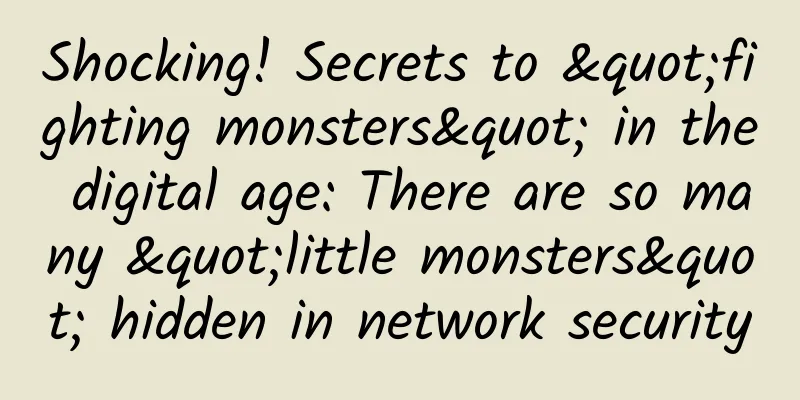Shocking! Secrets to "fighting monsters" in the digital age: There are so many "little monsters" hidden in network security

|
In this digital age, the Internet is like an invisible net that connects us closely. We shop, socialize, study, and work online, and the Internet has brought us unprecedented convenience. However, the Internet world is not a pure land. Various network security threats are like "little monsters" hiding in the dark, threatening our information security and property security at all times. Today, let us step into the world of network security and learn how to "fight monsters and upgrade" to protect our digital life. What is cybersecurity? In simple terms, network security is to take necessary measures to prevent attacks, intrusions, interference, destruction, illegal use and accidents on the network, so that the network is in a stable and reliable state and the integrity, confidentiality and availability of network data are guaranteed. Sounds a bit complicated? For example, the network is like our home. Network security is to install solid door locks, anti-theft windows, and set up alarm systems to prevent thieves (hackers) from breaking in and protect the property (data) at home from being stolen or destroyed. Source: Pixabay Network security is of vital importance. Here are some common network security threats: Malicious programs: the lurking "virus monster" Malicious programs are one of the most common cybersecurity threats, including computer viruses, spyware, ransomware, malicious adware, etc. Just like viruses can make us sick, malicious programs can cause damage once they enter our computers or mobile phones. For example, computer viruses can replicate themselves, infect other files, slow down or even paralyze the system; spyware can secretly collect our personal information, such as account passwords, address books, etc., and then send them to hackers; ransomware is even more hateful, it will encrypt our important files and then ask us to pay a ransom to unlock them. Phishing websites: the masters of disguised traps Phishing websites are one of the common means of online fraud. Hackers will imitate the pages of regular websites, such as bank websites, shopping websites, etc., and then trick us into clicking by sending emails, text messages, or posting links on social media. Once we enter sensitive information such as account numbers and passwords on phishing websites, they will be stolen by hackers. Imagine that you thought you were logging in on a regular bank website, but you told the scammers your account number and password. Isn't it terrible? Image source: Pixabay Malicious QR Codes: Hidden Time Bombs Malicious QR codes are generated by malicious websites through network technology. Once we scan them with our mobile phones, we may enter malicious websites, or be lured into entering personal information, or even the background permissions of our mobile phones may be secretly enabled. For example, in some public places, we may see some free QR codes that can be scanned to receive gifts. But these QR codes are likely to be malicious, and once scanned, our mobile phones will be controlled by hackers. Therefore, do not scan QR codes of unknown origin at will, especially those free QR codes that look tempting. Fake free Wi-Fi: A sweet trap In order to save traffic, we may connect to free Wi-Fi nearby when we go out. But did you know that these free Wi-Fi may be traps set by criminals? Under the guise of providing free Wi-Fi services, they will invade our mobile phones through the background to spy on privacy and collect data. For example, when we connect to free Wi-Fi, the transmitted data may be monitored by hackers, and information such as account passwords may be stolen. Therefore, try not to connect to unfamiliar free Wi-Fi, especially those without passwords. If you must use public Wi-Fi, try not to perform operations related to funds, such as bank transfers, payments, etc. Knowing so many cybersecurity threats, we must know how to prevent them: Sufficient length and complexity: When setting a password, the length should be no less than 8 characters and must contain uppercase and lowercase letters, numbers, and special symbols. Avoid using a single character type. Avoid weak passwords: Common weak passwords, such as "123456", "password", "admin", etc., should not be set as passwords. These passwords can be easily cracked by hackers; Different passwords for different accounts: Do not use the same password on all systems or platforms. If the password of one account is leaked, other accounts will also be at risk. For example, if your email password is the same as your bank account password, once your email password is cracked, your bank account may also be stolen; Change your password regularly: Changing your password regularly can reduce the risk of your password being cracked. It is recommended to change your password every few months; Prevent web pages from automatically remembering your account password: Do not allow web pages to automatically remember your account password on public computers or in unsafe network environments. This can prevent others from obtaining your account information after you leave. Cybersecurity is an issue that each of us needs to pay attention to. Let us start from now on to learn cybersecurity knowledge, improve cybersecurity awareness, master methods to prevent cybersecurity threats, and "fight monsters and upgrade" together in the cyber world to protect our digital life. Remember, cybersecurity is for the people, and cybersecurity relies on the people. Only when each of us takes action can we jointly create a safe, healthy, and orderly network environment. Source: School of Computer Science and Engineering, Chongqing University of Technology Author: Chongqing University of Technology, Guo Xiaoli Audit expert: Ni Wei Statement: Except for original content and special notes, some pictures are from the Internet. They are not for commercial purposes and are only used as popular science materials. The copyright belongs to the original authors. If there is any infringement, please contact us to delete them. |
<<: Beware of willow catkins during the Qingming Festival! Can catkins cause allergies?
Recommend
Can't you learn Durex? Because you don't understand these 6 marketing ideas...
poet? Joke teller? Emotional expert? A veteran in...
Do you need a 256GB iPhone?
The first major news about iPhone 7 revealed in th...
Can aflatoxin really be detected using a flashlight?
There is a short video that says that aflatoxin, ...
I am so impressed by how information flow advertising is done!
After reading this article, I hope your informatio...
Gastric cancer is getting younger, so get rid of these bad habits now!
In the past, when I heard about elders getting st...
Can eating fish eyes throughout childhood really prevent myopia?
When I was a kid, I often heard the elderly say t...
What kind of "worm" was the Yunnanworm 518 million years ago? The top ten advances in Chinese paleontology in 2022 are released
When, where, and how did the key evolutionary lin...
What are the functions of financial mini-programs? How much does it cost to make a financial app?
With the advent of the 5G era, the financial indu...
Why I don't buy an Apple Watch
[[128371]] Since the release of Apple Watch, it s...
The magic weapon for subway advertisements to flood the screen!
As the leader in outdoor advertising, subway adve...
Xinjiang 40℃ VS Jiangsu, Zhejiang and Shanghai 40℃, what’s the difference?
#Zhejiang is already too hot to work#! In recent ...
A weather pattern shared by “Fog-locked Beijing”, “Sauna days” and “Pollen allergies”: Why is the weather so stuffy in autumn?
The recent fog in Beijing can be said to be one o...
Xiaomi has difficulty entering the US market, with operator subsidies becoming the primary problem
Chinese mobile technology company Xiaomi recently...
Apple chooses BOE as the winner, China's display industry may leap to the top ranks due to iPhone
BOE will miss out on the iPhone once again - but ...
Analysis of marketing promotion hot spots in September!
September is the start of the school year, and th...









